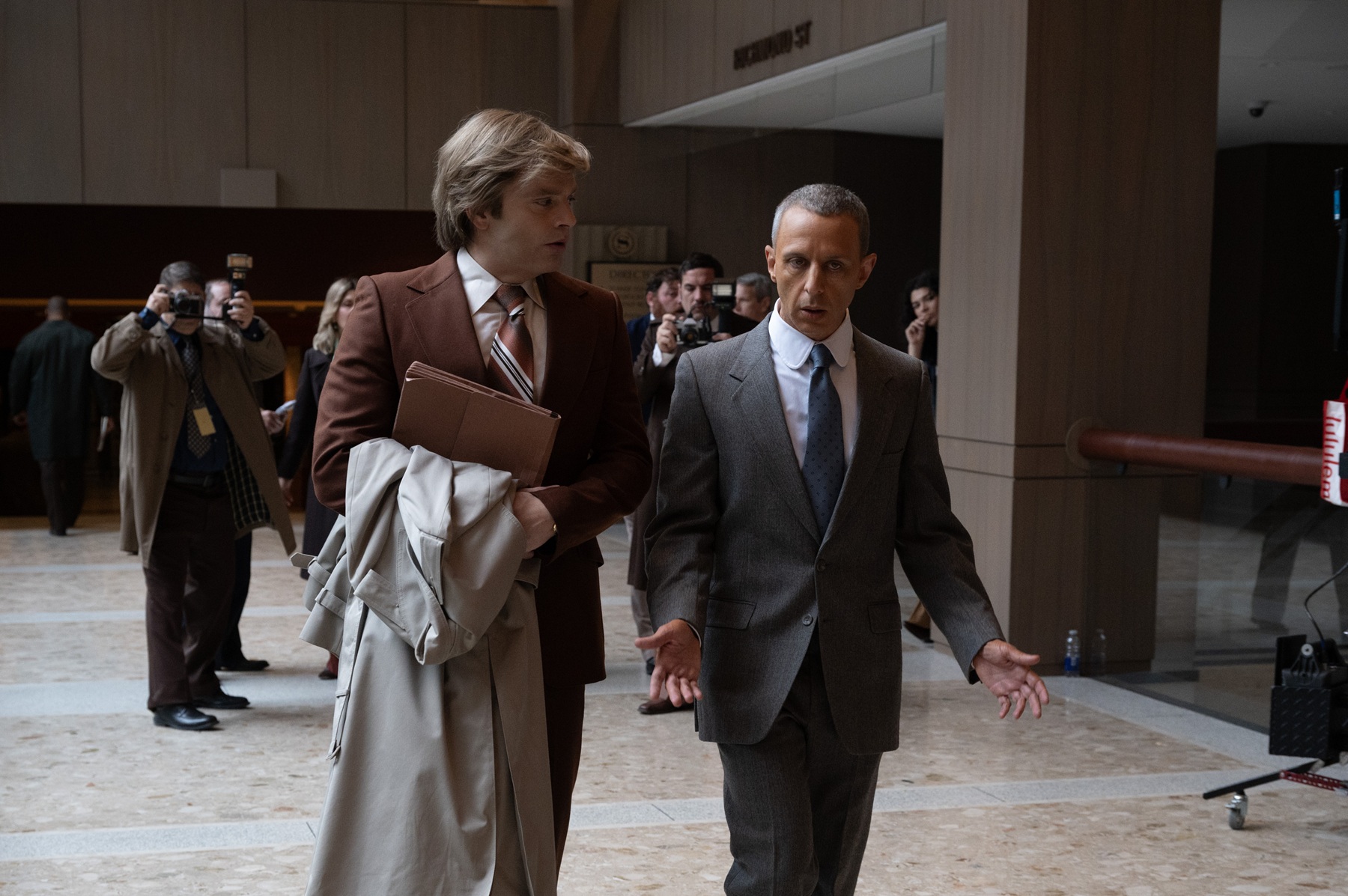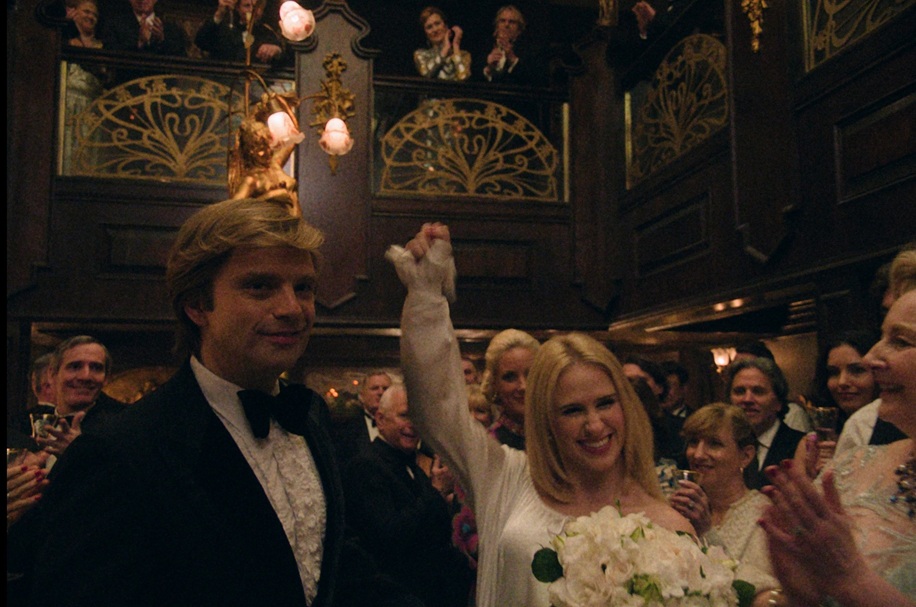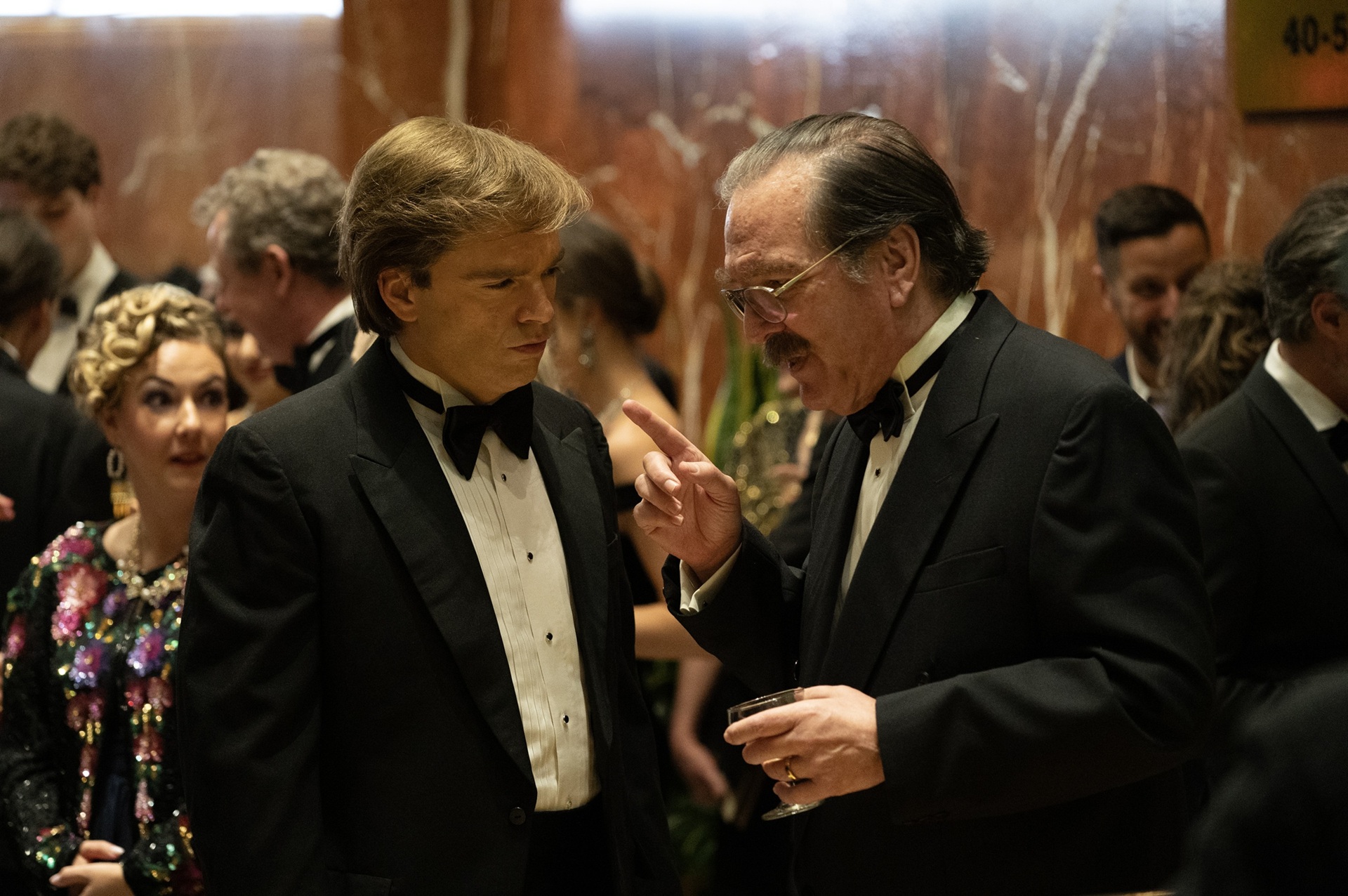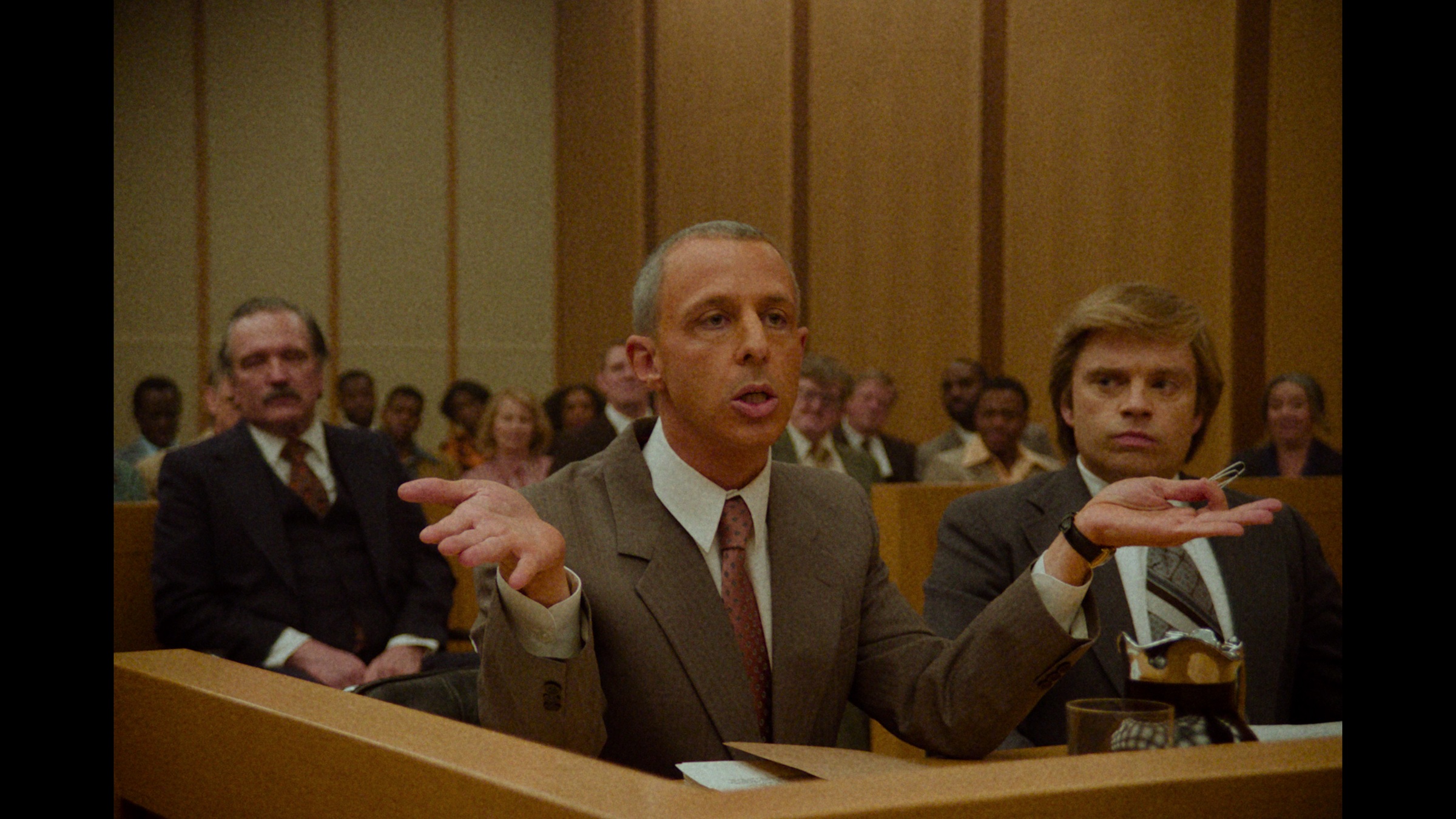‘The Apprentice’ chronicles the roots of a President’s rise to power

“The Apprentice” (2024). Cast: Sebastian Stan, Jeremy Strong, Walter Donovan, Maria Bakalova, Catherine McNally, Charlie Carrick, Ben Sullivan, Mark Rendal, Joe Pingue, Stuart Hughes, Ian D. Clark, Chris Owens, Valerie O’Connor, Tom Barnett. Director: Ali Abbasi. Screenplay: Gabriel Sherman. Web site. Trailer.
It’s virtually impossible these days to pick up a newspaper (remember what those are?) or visit an online news site without seeing something about Donald Trump. Regardless of what one thinks about the President, his presence in our lives, journalism and very existence is ubiquitous. And, because of that, there’s essentially no way of getting away from him. Having been elected to a second term, he obviously had (and, in many circles, still has) his legions of devoted supporters. By contrast, though, in light of recent events, such as the No Kings demonstrations, and steadily declining poll numbers, he also has more than his share of detractors. Those on each side of the fence clearly know how to affirm their loyalty to their views. It’s a comparatively easy task for his backers. But, for those who disagree with his policies and practices, what does it take to make their opposing arguments most effective against such a powerful political force? That’s where the fact-based Trump biopic “The Apprentice” comes in.
In the interest of full disclosure, I freely admit that, when this film was released late last year, I was reluctant to see it, let alone write about it. Because I knew little about the picture before screening it, I had two overriding concerns that fueled my hesitancy: (1) would it be an unrepentant love letter to Trump, one that would potentially whitewash or ignore the widespread criticisms about him?; and (2) would it be an unrelenting smear job that relied on overhyped left-leaning rhetoric to build its case? Neither of those possibilities motivated me to want to see it. The reason? They raised issues for me in terms of my ability to assess the film as fairly as possible. If the picture assumed either of the foregoing stances, I feared that it might subjectively cloud my assessment by invoking my own political views of the President, thereby skewing my overall impressions of the film, and I honestly did not want that to happen. I realize that complete impartiality is virtually impossible to completely ignore when it comes to movie criticism, but I was nevertheless concerned that a hot-button subject such as this might cause my review to become unduly exaggerated or biased in either direction.
When the 2024 movie awards season rolled around, however, in light of the many accolades that this picture earned – including two Academy Award nominations – I realized that there was no way I could credibly ignore this release. So what was I to do? Could I successfully rise up to the challenge of reviewing it in a way that would keep me from compromising my principles while still offering an honest appraisal of the picture? That’s what I’ve wrestled with for many a month now, and I believe what follows accomplishes that goal as best as I know possible.

For starters, in the interest of transparency, I should say up front that I have primarily been a life-long Democrat, generally voting blue in most elections. However, there have been instances (admittedly not many) when I have cast ballots for Republicans, as well as independents and third-party candidates. I generally lean left politically, though I’m not intractable on this point, something that more often than not of late has caused me to become more of a centrist, especially when extremist platforms have emerged on both ends of the political spectrum.
I provide the foregoing background as a point of reference for readers, and, in composing this piece, I have diligently tried to keep those views from coloring my opinions on “The Apprentice” as a piece of filmmaking. With that said, though, I’ll admit that I have had to engage in my fair share of soul-searching when it comes to trying to find a way to even-handedly write about the most important takeaways from this picture without falling prey to political dogma. I sincerely hope I have succeeded on that front.
As I observed in the opening paragraph, one of the key questions that arose for me from this film is, how do Trump’s detractors make their arguments against him most effective? For me, the usual considerations come into play when crafting viable arguments against one’s opponent, such as citing documented facts and figures, engaging in aggressively scrupulous fact-checking, and conducting thorough due diligence. Those tactics should apply without question in any adversarial context, whether facing opposition from political, scientific, economic or any of a host of other standpoints. But are they enough in and of themselves to be effective and compelling? In my view, the answer is not necessarily. As this film shows, there’s another component that should be considered: understanding where one’s opponent is coming from, particularly by examining, understanding, appreciating and drawing upon said individual’s personal background and history. Such an analysis reveals much about the opponent’s character, tactics and motivations, and these traits provide a formidable starting point from which to develop a plan of action, regardless of the individual, ideology or actions in question.
As I discovered when I screened the film, that’s precisely what “The Apprentice” does best. Director Ali Abbasi and screenwriter Gabriel Sherman have joined forces here to depict Trump (Sebastian Stan) as a neophyte New York real estate operative working for the family business in the 1970s. He’s portrayed as someone still rather wet behind the ears, often coming under the scrutiny and harsh criticism of the family business patriarch, his overbearing father, Fred (Martin Donovan). But Trump’s fortunes change drastically when he meets and comes under the influence of a mentor, attorney Roy Cohn (Jeremy Strong), best known for his role as prosecutor in the espionage trial of Julius and Ethel Rosenberg and as counsel to Sen. Joseph McCarthy (R-WI) during the Congressional anti-Communist hearings in the 1950s, as well as a notorious “fixer” in legal circles in the 1970s and ʼ80s. Trump’s association with Cohn would change the direction of his life, initiating beliefs and practices that would come to color his perspective and, consequently, shape his experience as a real estate mogul in New York and Atlantic City and, eventually, in launching his entry into politics.

The impact of beliefs here is undeniable and relevant. In fact, as Cohn observes in the film, “You create your own reality; truth is a malleable thing,” the core principle of the conscious creation process, the philosophy that accounts for the unfolding of our existence. It’s not known whether either Trump or Cohn had definitively heard of this school of thought, but, based on Cohn’s aforementioned utterance, it’s apparent that he had some familiarity with its principles and that he effectively conveyed these insights to his protégé, who studiously embraced them as his own and put them to use in building his career. This marked the beginning of Trump’s rise to power, and understanding how and why it came into being as it did is essential for those seeking to challenge him and his policies and practices today. Indeed, if you want to know who you’re up against, you have to know where he or she is coming from, and that’s imperative in formulating a strategy that effectively counters any staunchly entrenched opponent, no matter what the milieu.
To that end, then, it’s important to grasp the specific beliefs that provided the foundation for Trump’s ascendancy, all of which he gleaned from Cohn. In essence, Cohn believed in three overriding principles from which he never deviated in attaining his own success: (1) always attack, (2) deny everything and (3) always claim victory and never admit defeat, no matter what. And, in employing these notions, Cohn would go to any lengths to make sought-after outcomes possible, legality questions notwithstanding, a truly audacious move for an attorney, who could easily be disbarred for engaging in these transgressions if caught.
Do the foregoing beliefs sound at all familiar where Trump is concerned? If one believes that they do, one need only look to where they came from and how they have manifested in his life in the ensuing years. And, for those who currently oppose the President and his policies and practices, understanding this is thus crucial in formulating strategies for challenging his actions.
Embracing these notions paid big dividends for Trump, not only in terms of building a real estate empire and amassing a material fortune, but also in becoming a high-profile celebrity. In fact, the onetime apprentice and diligently apt pupil of Roy Cohn would himself assume a mentorship role of his own in later years as evidenced in his hosting of the reality TV show The Apprentice. (And who says art doesn’t imitate life?)

However, as Trump’s story illustrates, ambition like this comes with fallout, too. Seeking the fulfillment of one’s aims may be fundamentally admirable, but, when those aspirations are allowed to manifest unchecked, without due regard for side effects, there are consequences to be had. As Trump’s power grew, he apparently began to assume that he could do whatever he wanted, whenever he wanted. And, as the film shows, these outcomes were attributable to his fidelity to Cohn’s teachings taken to an extreme. His success in business, for example, provided him with what he saw as a justification to openly and condescendingly show up his long-critical father, someone whose own accomplishments were vastly eclipsed by those of his son. He also drew upon these beliefs in trying to willfully manipulate circumstances with others, as seen in his relationship with his first wife, Ivana (Maria Bakalova), such as his strong-arm efforts to get her to sign a prenuptual agreement and his subsequent emotional abandonment of her after they were married. He even began marginalizing Cohn at a time when his mentor’s life began falling apart. Cohn, a closeted gay man, contracted AIDS and was dying, compromising his influence and his effectiveness as an attorney, developments that prompted Trump, when it suited his needs, to disregard the man who helped make him a huge success.
Indeed, as “The Apprentice” so poignantly and eloquently shows, beliefs can be powerful forces in shaping our lives, for better or worse. It all depends on what we do with them, again, for better or worse. And, when we make use of them without regard for the fallout, they can carry tremendous consequences. This becomes apparent, for instance, when Trump’s financial failings surface, issues that arose from his foregoing reliance on unrealistic notions of being able to do whatever he wanted, including where money was on the line. These circumstances thus illustrate how the “worse” in “for better or worse” can rear its ugly head.
The film concludes before the emergence of Trump’s political ambitions, but that, I believe, further proves my contention about the picture’s intent of illustrating someone’s roots and how they might be drawn upon in better understanding said individual and then using that knowledge to formulate a basis for opposition. That’s a fundamental lesson that can be employed in an array of other contexts, too, not just politics. However one draws on that wisdom in initiating his or her adversarial dealings, it’s something that can be put to effective use, provided one knows where to look and what to watch out for.
Despite my initial hesitancy to screen this offering, director Abbasi’s fourth feature outing turned out to be one of 2024’s truly surprising stand-outs, one that certainly deserved more attention and recognition than it received. This origin story about the meteoric rise of a New York real estate mogul who would eventually become President candidly illustrates how he became the individual he is today through the power of beliefs imparted by a dubious mentor. In that sense, one could arguably characterize this release as “instructive” about the nature of its protagonist and how his background presents us with the template driving his current policies and practices. While it may be difficult to substantiate the definitive validity of the events depicted here, given that this is a fact-based film, this offering nevertheless presents a highly telling tale, one fleshed out through the superb (and largely overlooked) script of screenwriter Sherman in only his second feature outing. Add to that the film’s fine editing, spot-on period piece production design, and outstanding performances of its two Oscar-nominated principals (particularly Strong), and one is left with a powerful, potent, convincing and enlightening combination of cinematic qualities.

Admittedly, while the film offers an excellent depiction of Trump’s apprenticeship in the business world, it could have been stronger when examining his personal life, particularly his stormy courtship of and arm’s-length marriage to wife Ivana, as well as his rocky relationship with his family, both of which could have used some bolstering. And, of course, some – like Trump and his lawyers – have contended that the picture is inherently flawed and biased, presenting a view of the protagonist that led to an unsuccessful attempt at blocking its US release. However, in light of those considerations, to quote Cohn once again, “truth is a malleable thing.”
In addition to its two Oscar nods for Stan and Strong, the picture captured a number of nominations in other 2024 awards competitions. The acting duo also earned Golden Globe and BAFTA Award nominations, with Stan additionally capturing an Independent Spirit Award nod for best lead performance and Strong garnering a Screen Actors Guild Award nomination for his outstanding supporting portrayal. On top of that, the film earned Independent Spirit Award nominations for best director and best editing, as well as a BAFTA nod for best casting. Finally, the Cannes Film Festival named it a nominee for the Palme d’Or, the event’s highest honor. And this doesn’t begin to take into account its many nominations among film critic organizations. The film is currently available for streaming online.
To be honest, I find it truly upsetting that anyone might feel compelled to foment opposition to those who are supposed to be operating in the public’s best interests. In this day and age, such matters should be beyond something we should have to consider. My belief in that notion might seem naïve and unrealistic. But, somewhat ironically, I concur with Cohn’s observation in principle that we each create our own reality, and I’d like to think that we’re capable of putting our beliefs to use in manifesting outcomes that work for us all in the end. Until then, though, if we need to devise the means to work around those who work against us, we should sincerely focus our efforts in doing so in ways that cause the least harm and the greatest benefit. That starts with understanding how we found ourselves embroiled in such circumstances in the first place – and hoping that it’s not too late to change conditions for the betterment of us all, regardless of who may or may not be on board with us in undertaking that venture.
Copyright © 2025, by Brent Marchant. All rights reserved.



